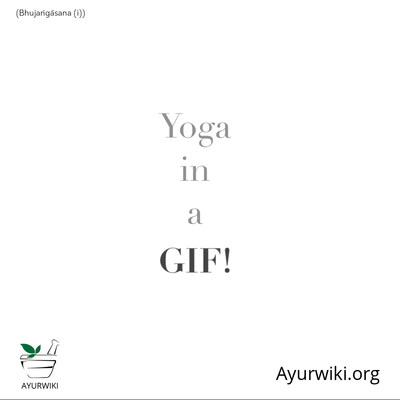Note: This is a project under development. The articles on this wiki are just being initiated and broadly incomplete. You can Help creating new pages.
Difference between revisions of "Bhujangasana"
| Line 13: | Line 13: | ||
# As you exhale, slowly come down rest with your hands below your head.<ref name="Technique"/> | # As you exhale, slowly come down rest with your hands below your head.<ref name="Technique"/> | ||
| − | |||
| − | |||
| − | |||
==Effects== | ==Effects== | ||
Revision as of 18:44, 1 November 2018
In Sanskrit bhujanga means snake and asana means pose; that’s why this yoga pose is referred to as the Cobra Pose. This pose mimics the posture of a cobra that has its hood raised. It is the eighth pose in the 12 poses of the Surya Namaskar or Sun Salutation yoga routine.
Contents
Technique
- Start by lying on your stomach and rest your forehead on the floor.
- Keep your feet together and your toes touching the ground. Place your hands at shoulder level and palms on floor
- As you inhale lift your head, chest and abdomen and make sure that you keep the navel on the floor.
- Hold this posture for 5 breaths
- As you exhale, slowly come down rest with your hands below your head.[1]
Effects
- Stretches muscles in the shoulders, chest and abdominals and decreases stiffness of the lower back.
- Strengthens the arms and shoulders and increases flexibility.
- Improves menstrual irregularities, elevates mood and firms and tones the buttocks.
- Invigorates the heart and stimulates organs in the abdomen, like the kidneys.
- Relieves stress and fatigue and opens the chest and helps to clear the passages of the heart and lungs.
- Improves circulation of blood and oxygen, especially throughout the spinal and pelvic regions.
- Improves digestion, strengthens the spine, soothes sciatica.
- Helps to ease symptoms of asthma[2]
Related Asanas
Special requisites
This exercise should be avoided if you suffer from the following problems:
- Hernia
- Back injuries
- Carpal tunnel syndrome
- Headaches
- Pregnancy
- Recent abdominal surgeries
Initial practice notes
As a beginner, you must not go all into the asana. If you do so, you will end up straining your back and neck. You must find a height that suits you, and ensure you don’t strain your back and neck. Once you do, take your hands off the floor for a moment so that you have a thorough extension.[3]
References
External Links
- Yoga
- Curative Asanas for - Arthritis of the dorsal region
- Curative Asanas for - Asthma
- Curative Asanas for - Bronchitis
- Curative Asanas for - Chest
- Curative Asanas for - Coccyx
- Curative Asanas for - Diabetes
- Curative Asanas for - Displacement of the spinal discs
- Curative Asanas for - Hunchback
- Curative Asanas for - Kidneys
- Curative Asanas for - Legs
- Curative Asanas for - Lumbago
- Curative Asanas for - Sciatica
- Curative Asanas for - Dyspepsia
- Curative Asanas for - Gall bladder and liver exercises
- Curative Asanas for - Heartburn
- Curative Asanas for - Liver
- Curative Asanas for - Spleen
- Curative Asanas for - Pancreas
- Curative Asanas for - Intestines
- Curative Asanas for - Obesity
- Curative Asanas for - Rheumatic pains

